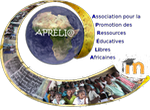Presentation
 The Apréli@ Network
The Apréli@ Network
Educative e-Twinnings
Teacher's Guide
Welcome to the Apréli@ e-twinning community
You are going to participate in an innovative educational experience: your class’s e-twinning with a class in another city, another country or even another continent.
The working method will allow your pupils to have a real audience who will appreciate the work that they will carry out normally in the classroom, whether in English, science, history and geography and in most disciplines. The normal school curriculum is therefore not changed, but is tackled in a motivating environment that allows pupils:
- to (re)discover their world to make the partner class dicover it
- to discover their partner class’s world
- and, perhaps, rediscover their own world through the eyes of their partner class.
You will not constantly be working through the e-twinning with your partner colleague (the teacher of the class partner): you will decide on the themes and moments that best suit your curriculum and your annual progress.
The e-twinning pedagogical model reflects the belonging to a community in which the participant travels from the nearest and best known to go to the farthest and discover the Other, in a double movement: that of decentring to meet the Other coupled with that of centring and of reflection on oneself.
The Apreli@ educative e-twinning is not a traditional school letter exchange where it is often the case that each pupil has a dedicated penfriend with whom s/he exchanged very specific personal information. Our model strongly favours the collective: the aim is therefore not for individuals to present items, but rather for the whole class to arouse their partner class’s curiosity, and make them want to know more ... this will be done through the various chapters of the Travel Diary.
The aim of the exchanges is for each class to produce a digital Travel Diary on the partner class’s town. To achieve this, each class needs to ask its partner class to gather information about itself, its school, neighbourhood, city, region, country, then process the information, organize and present it. To collect the information, pupils call on various resource persons, e.g. parents and local elected officials. The final production, the digital Travel Diary, will be posted on the partner township website, and reflect a collaborative effort involving the school and its partners.
To complete the Travel Diary, pupils will carry out two types of activities:
- research, organise and format information about their own environment - including elements of cultural context -, and send them to partners
- understand, organise and format information received from their partners and, if necessary, request additional information from them
|
| Home-page | The Teacher Educator's Resources (in French) |
TESSA pedagogical support | IFADEM computer literacy (in French) |

